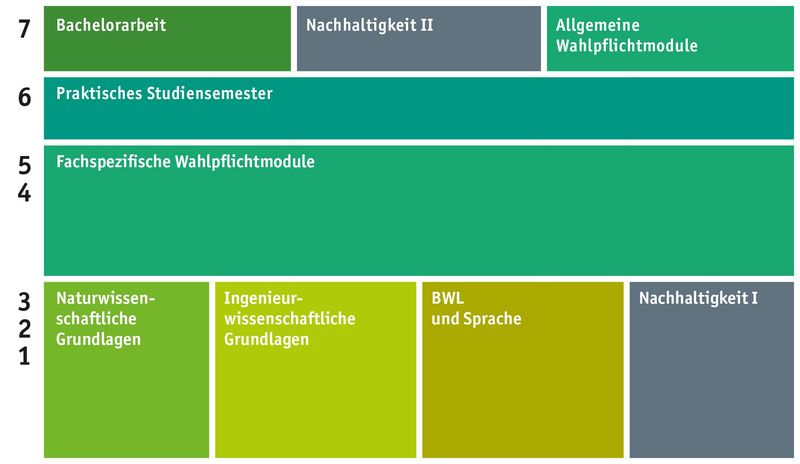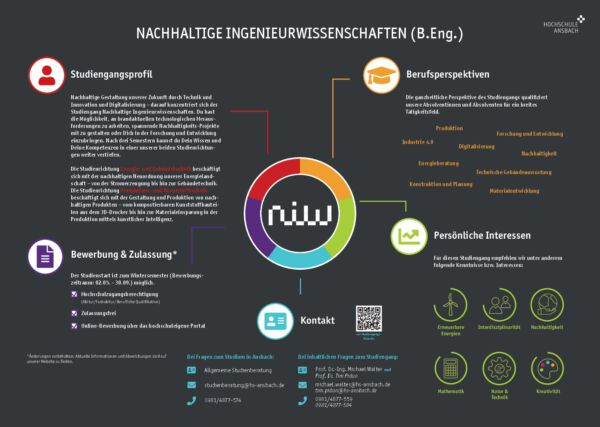Energy and Building Technology
Short Profile | Study | Contents | Teaching Methods | Perspectives | Application | FAQs
Short Profile
The field of study Energy and Building Technology (EGT) is an offer from the Sustainable Engineering Bachelor’s degree programme. In the first three semesters, students complete the basic studies together. The specialisation in EGT takes place at the beginning of the fourth semester.
In the course of the specialisation in energy and building technology, you will deal with the sustainable generation, consumption and distribution of energy. In the field of building technology, you will learn about two central components of sustainable building technology: building construction and the technical equipment of buildings.
After seven semesters of standard study time, you will graduate with a Bachelor of Engineering degree.
Study
Your Bachelor’s degree programme comprises seven semesters. In the first three semesters, you will mainly learn important engineering basics and get an overview of the many aspects of sustainability. At the beginning of the fourth semester, you decide on your field of study and specialise in it from then on.
Within your field of study, we offer you the opportunity to individually select subjects and topics that you consider relevant to you. During the sixth semester, the practical study semester, you will gain your first practical experience as a future sustainability engineer in a company.
In the last semester, you will complete your Bachelor’s thesis and deepen your knowledge of sustainably designed products and processes. Throughout your studies, the sustainability goals will accompany you as an integrative element of various modules.
Contents

In the course of the specialisation programme in energy and building technology, you will deal with the generation, consumption and distribution of energy. Saving energy, integrating eco-energies and climate protection in the context of economic and legal challenges are high on the social agenda and on your timetable. Energy trading plays another role in your education.
In view of the accelerated phase-out of nuclear power, the expansion of renewable energies, the promising combined heat and power generation, the targeted grid expansion and the measures to improve energy efficiency, optimised energy systems and improved energy supply structures are becoming more and more urgent – your training has its finger on the pulse and will provide you with sound knowledge to solve the associated problems.
Get more information on this course of studies.
Teaching Methods
On the one hand, you can apply many of the study contents in the practical semester. On the other hand, you will discover how important it is to be able to familiarise yourself with new tasks independently.
According to your choice of field of study, you will look for an internship on your own responsibility. The areas of activity during the internship semester are as varied as the career opportunities.
Here you will often take on project responsibility very soon and be directly involved in day-to-day business. For many, the internship semester also opens the door to a future job.
Perspectives
The diversity of the degree programme is reflected in the career prospects. Employers particularly appreciate the broad basic knowledge and practical skills of our graduates. Combined with the specialisation in the main study programme, many occupational fields open up in the engineering sector.
The study of sustainable engineering optimally prepares you for your professional life. Depending on the orientation of your studies, you can work in a variety of companies and research institutions in a wide range of industries. For example, you will find your challenges in the following industries:
- Plant and Mechanical Engineering
- Automation and Electrical Industry
- Consulting
- Energy Supply Companies
- Engineering Offices
- Chemical and Industrial Production Plants
- Public utilities
- Technical service in public authorities, in companies in the biotechnology and environmental technology sectors and in information and communication technology.
Ansbach University of Applied Sciences offers various Master’s degree programmes that you can take following your Bachelor’s degree:
Application
Are you interested? Then apply here for our Sustainable Engineering Sciences (NIW) degree programme.
During the online application, you can already specify a desired field of study – don’t worry, this is not yet final. You will only make the final decision for your field of study at the end of the third semester. This means that the first three semesters offer you enough time to get your bearings and to discover the fields of study that interest you.
The application period is from 2nd May to 30th September inclusive. The programme begins in the winter semester on 1st October.
If you have any questions, please contact the Student Services.
Kontakt:
Stefanie Fries
studierendenservice.niw@hs-ansbach.de
Room 54.1.10
By prior arrangement
Note for transfer students:
Students who change their course of study can enter a higher subject semester. This is possible for the winter semester as well as for the summer semester.
Previous achievements that have a subject related equivalent in the Applied Engineering Science Programme can be recognized.
To do so, compare the module handbook of your previous degree programme with that of the Applied Engineering Sciences Program. If you have subjects from higher semesters recognized, you will determine your field of study at the same time. Invest the time to read the module manuals, because it is your achievements that you can have recognized for your new degree program! Please note the general information for university and program transfer students.

